The first page opened with the poem, "You Conquer Me, Me Conquer You" followed by a letter from Rev. Edward F. Wilson of the Shingwauk Home titled "An Indian School in Canada," which described Wilson’s report to the Indian Department of Canada on his visit to Carlisle, the Lincoln Institute and the Hampton Institute. It continued on the last…
Indian Helper, The (1885-1900)
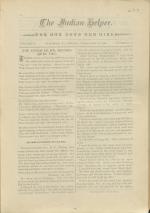
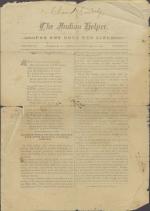
The first page opened with a poem titled “New Every Morning,” followed by "An Indian Woman Fought For Her Husband After Receiving a Beating From Him" which concluded on the fourth page. Page two gave news from the Chemawa and Genoa Indian Schools, and "A Nice Pocket Book for the Best," asking for wish lists from the trade departments. Next came…
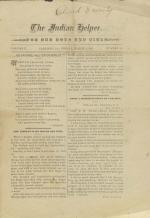
The first page opened with a poem titled “So Say We, All of Us Girls,” followed by “The Indian’s Hair Would Not Curl,” by Aunt Martha that recalled a comical hair care story involving Aunt Martha’s friend and a visiting Indian chief. “From a Former Student of Carlisle” reprinted a letter to Capt. Pratt from former student Frank Aveline (Miami)…

The first page opened with a poem titled “Take Care,” by Alice Cary, followed by a report of “An Old Osage,” that blamed the poor conditions on the reservations on the lack of schooling. The article, written by “Aunt Martha,” concluded on the fourth page. Page two opened with “God Helps Those Who Help Themselves,” reporting the efforts of the…
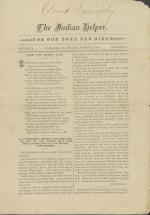
The first page opened with a poem titled “Take the Sunny Side,” by “Ex.” Also found on that page was “An Interesting Letter from John Dixon, One of Our Pueblo Boys Who Went to His Home in New Mexico Last Summer” addressed to Mr. Campbell. Dixon wrote about celebrating George Washington’s birthday, looking for railroad work and visiting the…
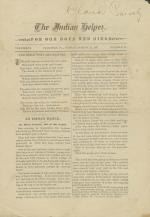
The first page opened with a poem titled “The Girls that are Wanted,” author unknown, followed by “An Indian Dance: By Dessie Prescott, One of Our Pupils.” Also on the page was an article about the importance for Americans to know their history. Page two opened with a treatise on patriotism, followed by a report by Joshua Given that the…

The first page opened with a poem titled “The Boy and the Bird,” author undetermined. The next article was titled “How the Indian School Girls in Sitka, Alaska, Got Ahead of the Indian Boys,” which concluded on the fourth page. Page two contained articles about returned students, John Davis (Pueblo) writing from his country home, and a piece…
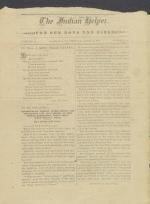
The first page opened with a poem titled “To Tell a Good House-Keeper,” reprinted from The New Moon. Also on the page was an account by Johnnie Schmoker about bird hunting at the Cheyenne and Arapaho School in Oklahoma titled “INCIDENTS OF SCHOOL WORK AMONG THE CHEYENNES AND ARAPAHOES, IN THE INDIAN TERRITORY, WHEN THEY WERE REALLY…
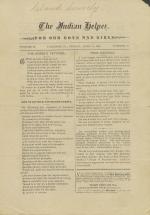
This issue opened with a poem titled “THE HORSE’S PETITION,” followed by an alphabet poem titled “HOW TO GET RICH AND BECOME FAMOUS.” “TRUE COURAGE” offered a treatise on the rewards of kindness. Page two opened with news of a measles outbreak at the Ponca Agency, the influence of Carlisle students at the Crow Reservation, a report on the…
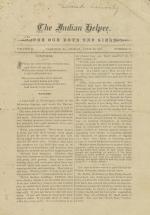
This issue opened with a poem titled “Kindness” followed by a reprint from the Word Carrier, “Manners” that compared ill-mannered behavior to animal traits and was intended as a lesson to Carlisle students. Also on that page was a paragraph reprinted from the Genoa Indian School describing a farming contest challenge between the Genoa…
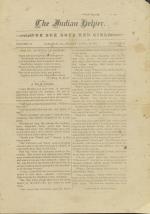
This issue opened with a poem titled “For Us, As Well as Others,” by Mary H. Krout, followed by “A True Story” shared by “Aunt Martha” about some mistaken identities among the Sioux and Pawness in Nebraska. The story continued on the fourth page. Page two included a reprint of Carlos Montezuma’s letter from Chicago dated April 24, 1887 titled “…
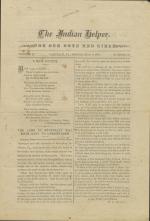
The Indian Helper opened with a poem titled “A New Citizen,” written by Elsie Fuller (Omaha) who was a student at Hampton Institute, reprinted from “Talks and Thoughts.” The next article was an explanation of the Dawes Act written by Sen. Henry Dawes and titled “THE LAND IN SEVERALTY BILL MADE EASY TO UNDERSTAND.” Page two was taken up…
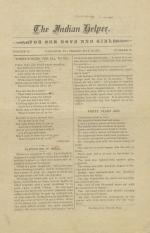
This issue opened with a poem titled “THERE’S WORK FOR ALL TO DO,” followed by an article titled “ALWAYS DO IT WELL,” espousing the value of diligence and care no matter how important the job. The final article on the page was titled “FORTY YEARS AGO,” that continued on page four and listed technological changes made over a forty year span of…
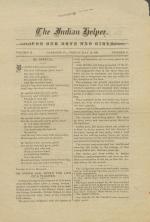
This issue opened with a poem titled “BE CAREFUL,” followed by an account of how “Aunt Martha” nearly drowned near the Genoa School in Nebraska titled “AN INDIAN GIRL SAVED THE LIFE OF A TEACHER,” followed by a reprint from The Indian Citizen that extolled the competence of Indian boys. Page two featured small news items that included…
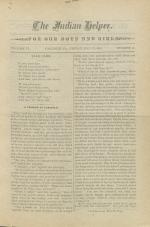
The first page opened with the poem "Take Care" followed by "A Visitor at Carlisle" which provided the opportunity to present arguments for Indian education away from the reservations. It continued on page four. Page two opened with an account of a presentation by "Dr. Harmon and Col. Thomas," a Dickinson College professor and his former…
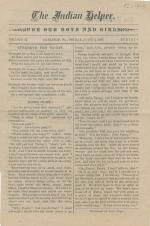
The first page opened with the poem "Strength For To-Day" followed by a piece called "Going Home!" The article gave a fictitious conversation between Carlisle students Allie and Fanny about the disadvantages of going home to the reservation because of the unsanitary conditions and practices there. It continued on page four. Page two featured…
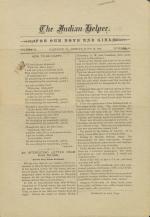
This issue opened with a poem titled “HOW TO BE HAPPY,” reprinted from Selected. The next item which continued on page four was a travelogue of school nurse, Miss Wilson’s, trip to Scotland, an ocean voyage that lasted eleven days, titled “AN INTERESTING LETTER FROM MISS WILSON: All the Way from Scotland.” Page two opened with a column…
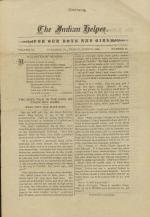
This issue opened with a poem titled “A CLUSTER OF NEVERS,” from Selected, followed by a fictionalized conversation between two boys traveling to their homes in the west from Carlisle titled “TWO BOYS TALK IN THE CARS ON THEIR WAY HOME: WHAT THEY MAY HAVE SAID.” In the conversation, “Ira” and “Bart” muse about their appreciation of…
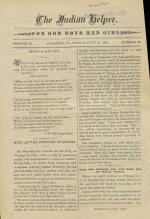
The first page opened with the poem "What a Jug Did," reprinted from An Old Scrap Book followed by a piece called "Nice Letter from Mr. Standing," made up of abstracts from his trip West returning Carlisle students to their home agencies. Standing mentioned there was a special travel car for girls and sick students, and described his…
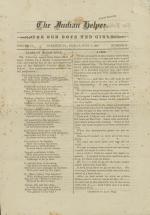
This issue opened with a poem titled “CLASS OF INDIAN BOYS,” written by a Quaker farm wife about a group of Outing students. The next article was titled “A TRIP” by Katie Grinrod (Wyandotte), which gave the account of her and Clara Cornelius’(Oneida) trip to Philadelphia with their Outing family. Page two opened with “A Better Chance” that…
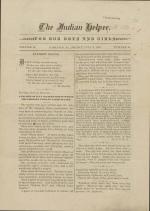
This issue opened with a poem titled “EARNEST LIVING,” by C.M. Sheldon. The next article was written by Dessie Prescott (Sioux) titled “A FOURTH OF JULY CELEBRATION IN WHICH THE SISETON INDIANS PARTICIPATED,” which described the holiday program from 1884, in Sisseton, South Dakota, in which participants reenacted battles, held horse races and…
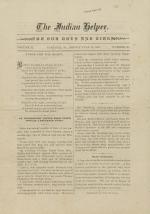
This issue opened with a poem titled “STAND FOR THE RIGHT,” followed by “AN INTERESTING LETTER FROM PETER POWLAS (Oneida), A RETURNED PUPIL.” Mr. Standing gave a report on the crop conditions in Indian Territory and a piece called “Home Politeness,” about the importance of good manners which continued on the fourth page. Page two included short…
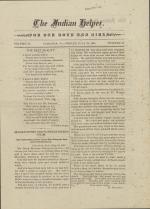
This issue opened with a poem titled “THE BEST BEAUTY” reprinted from Golden Days, followed by “MISSES IRVINE AND BURGESS HEARD FROM: The Following Letter from Miss Burgess Has Just Been Received” dated July 16, 1887 from Chicago, Ill. In the letter, the chief clerk told about their train ride from Harrisburg and described their hotel…
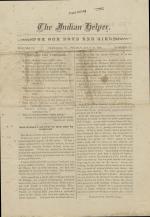
This issue opened with a poem titled “THROUGH AND THROUGH” reprinted from Scattered Seeds.” Also found on that page was “MISS WILSON’S ACCOUNT OF HER TRIP TO SCOTLAND,” a travelogue of the teacher and her sister’s visit by ocean liner to Scotland and Ireland and back. Page two opened with “A Child’s Wise Speech,” that described the…
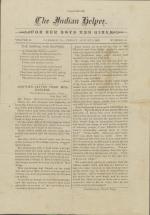
This issue opened with a poem titled “THE SOWING AND REAPING,” followed by “ANOTHER LETTER FROM MISS BURGESS: PINE RIDGE AGENCY, DAK., July 23rd, 1887,” addressed to the Man-on-the-band-stand that described a trip in which she and Miss Irvine traveled to South Dakota and met up with many former Carlisle Indian School students from the Pine…
